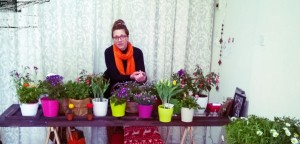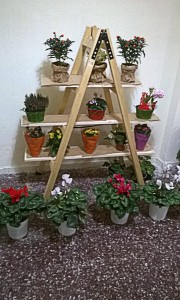There are millions of dyslexics among us, but very few of their personal success stories have been heard.
Julie Logan* at CBS London estimates that about 20% of the population in the UK who have started their own business have a learning disability condition.
 Urania Stamouli
Urania Stamouli is an agronomist and professional beauty therapist.
As a dyslexic, she encountered numerous obstacles but manage to overcome all of them and today she has started her own business in Glossa,
Skopelos, Greece. She is hopeful that her story will inspire many people in Greece who struggle at these difficult times.
The school years
I was diagnosed with dyslexia in second grade. Although my school teacher used to say that I wouldn’t make it to college, a family friend introduced us to a speech and language therapist and she diagnosed my dyslexia.
Sadly enough, a student teacher wasn’t able to handle a dyslexic pupil. And I can realize this now, after so many years and looking back at the late 80s when dyslexia was not yet in Greek dictionaries.
At school, I was just a “bad student”, not being able to follow the pace of the teacher or the majority of the students, was never good at grammar and my writing skills were not my forte.
In my day-to-day life, I didn’t experience any difficulty, apart from taking me way too long to read and finish my homework. But after attending private classes from the age of 11, everything became easier.
Growing up I discovered ways to overcome any difficulty connected to my learning disability. It was always difficult to form my thoughts and speak them out, but once I started, it all came naturally. It’s funny that even when arguing with people, I used to reply a day after their argument, needing time to process what they wanted to say and what their point was.
A small piece of advice to parents: No kid is stupid or less capable. Embrace your child’s learning disability, pay attention to every detail and help it overcome every struggle. It is easy to give up or say “(S)he just doesn’t get it”, but it is even easier to go further and prove that everyone has the right to progress in life – we are all different and we all have our way of ‘getting’ things.
Leaving the city for the island

I never actually left the island for good. I grew up in Volos, Greece but used to go to the island for Christmas holidays, Easter and for long summers. I always loved being back, but if someone asked me to live here forever I would probably laugh. In Skopelos, I loved the calmness, the proximity to nature and other people, the feeling of the sea and the warmth every day. In winter everything is so quiet but you enjoy quality time alone. And then April comes again and the island becomes overpopulated with people from all over the world, bringing life to the place.
With the recession hitting my business and changing my lifestyle, my perspective changed. I was unable to find employment in my sector and after 1,5 years of being unemployed, I went to the island to work as a beauty therapist in a hotel for the summer.
I needed to do something professionally though. The job at the hotel was good in summer, but then winters were becoming longer and longer and I needed to find a way to streamline my creativity. The idea of going back to the city meant going back to unemployment and struggle. So I decided to try something within the field of my first studies, agriculture, and I opened my flower shop.
winters were becoming longer and longer and I needed to find a way to streamline my creativity. The idea of going back to the city meant going back to unemployment and struggle. So I decided to try something within the field of my first studies, agriculture, and I opened my flower shop.
The first month hasn’t been easy. But people embraced my initiative and I am positive for the future. It is good for the island to have new people around, and to see new things happening. Most of the businesses work well in summer only and I am aware of the risk. But I felt I needed to do something for my town, to contribute somehow to the community and I am optimistic that it will all go great.

 Urania Stamouli is an agronomist and professional beauty therapist.
Urania Stamouli is an agronomist and professional beauty therapist.
 winters were becoming longer and longer and I needed to find a way to streamline my creativity. The idea of going back to the city meant going back to unemployment and struggle. So I decided to try something within the field of my first studies, agriculture, and I opened my flower shop.
winters were becoming longer and longer and I needed to find a way to streamline my creativity. The idea of going back to the city meant going back to unemployment and struggle. So I decided to try something within the field of my first studies, agriculture, and I opened my flower shop.